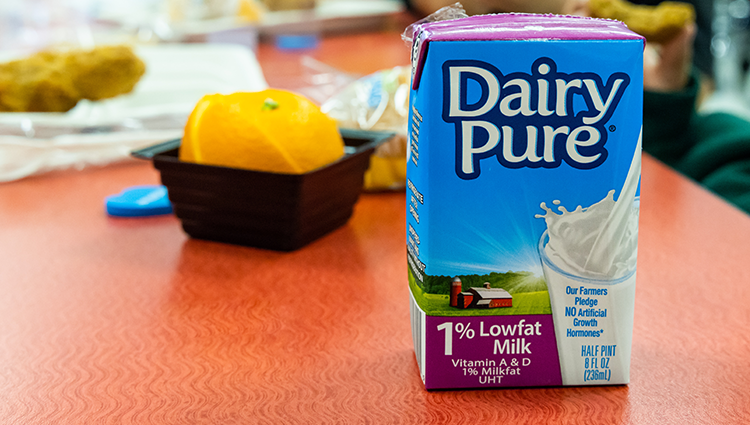In January 2022, Dairy MAX and Dallas ISD, in partnership with Tetra Pak, launched a pilot to test shelf-stable milk at nine elementary schools. The nine selected schools were spread out across the roughly 230 schools in the district, allowing more diversity in location and in the results. Overall, results from this pilot showed it was successful. Net milk consumption increased by 12%, average meal participation also went up by 9% and there was a 5% reduction in milk waste. This means that more students had a healthy school meal and took milk. And of the students who took milk, they drank more of it.
What Is It?
Shelf-stable milk is the same milk that comes in traditional chilled packaging. To allow for a shelf life of more than six months with no refrigeration needed before opening, the milk undergoes Ultra High Temperature (UHT) processing and is then filled in Tetra Pak® aseptic cartons. UHT processing combined with an aseptic carton retains the nutritional values of dairy milk without the use of additives or preservatives. It comes packaged in environmentally sound aseptic carton packaging that does not require refrigeration until opened, is made primarily of renewable materials and is recyclable.
The Results!
Results from this pilot were so positive that the nine Dallas ISD elementary schools that were part of last year’s test will continue to receive shelf-stable milk and the district is working to incorporate several middle and high schools as well.
Overall wins:
- Milk consumption rose 12% compared to only 2.4% for the rest of the district. That is over a 14-point difference!
- Average meal participation increased by 9%.
- Milk purchases rose by 6% and waste declined by 5%.
Dallas ISD attributes the meal increase to the milk change, as no other changes were made. Meals across the rest of the district were only up 1%, so 8 points were attributed to the pilot.
As part of the study, cafeteria staff was interviewed. When asked about the reasons they prefer shelf-stable milk, the answers included: easier to open, fewer spills, clean, having a straw is easier for students, it keeps longer and looks good.
- 62%, said students “liked” or “definitely liked” the shelf-stable package. Only 31% said students were “indifferent.”
- 38% of staff perceived they served more trays/meals as a result of the shelf-stable milk.
Economic benefits of shelf-stable milk have been found in delivery frequency, accounting/payables and miles driven.
- Shelf-stable and self-distribution combined savings was $.06021/serving.
When students were surveyed, 73% of students drank milk with lunch on the survey day.
- Familiarity with shelf-stable milk was 76% (higher than most.)
- 49% of students who periodically drink milk indicated they “liked” or “loved” it.
Why Is It important?
Nutrition is critical to a successful learning environment as educators report that school meals combat lack of energy, poor academic performance and inability to concentrate. Milk can benefit a student’s overall well-being as it is packed with 13 essential nutrients, including protein, which helps to combat hunger in the classroom. Results found that 39% of students rely on school meals for their milk consumption. Every year Dallas ISD schools supply students with over 1.5 million gallons of milk, With this in mind, schools are looking to provide milk in the most responsible way possible.
Along with being a key nutritional element, there are many challenges in the school milk landscape today. School milk sales have declined by 65 million gallons since the 2008-2009 school year. There have been fresh milk plant closures in the southeast that represent nearly 150 school districts serving approximately 1,450 schools. Labor shortages continue, reducing milk deliveries, especially in rural areas. Finally, food inflation is at a high of 11% and families are having to make tradeoffs that may impact nutrition.
Based on the results of this pilot, shelf-stable milk has the potential to help school districts better manage costs, increase meal participation, reduce waste and more!




